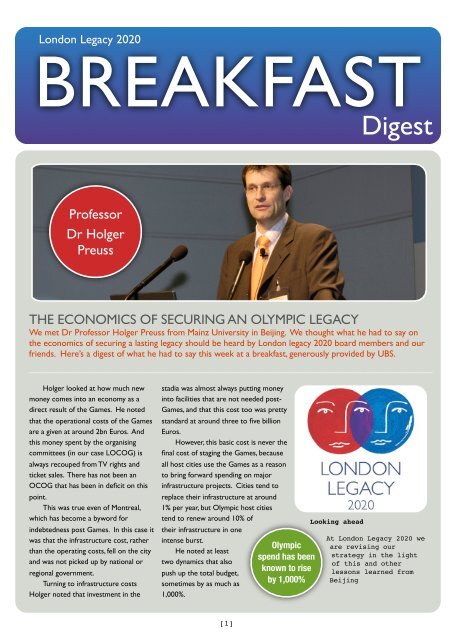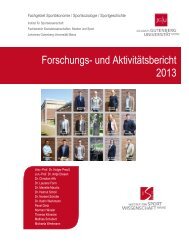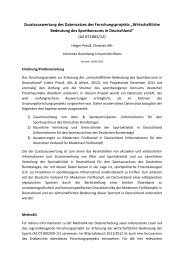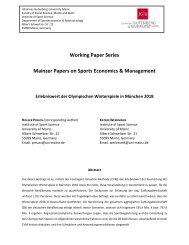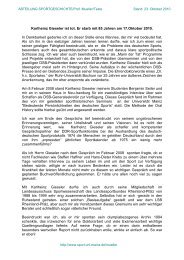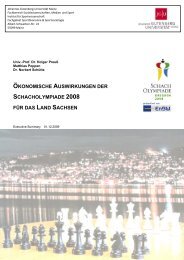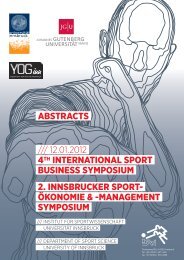Holger Preuss notes
Holger Preuss notes
Holger Preuss notes
You also want an ePaper? Increase the reach of your titles
YUMPU automatically turns print PDFs into web optimized ePapers that Google loves.
London Legacy 2020<br />
BREAKFAST<br />
Professor<br />
Dr <strong>Holger</strong><br />
<strong>Preuss</strong><br />
THE ECONOMICS OF SECURING AN OLYMPIC LEGACY<br />
We met Dr Professor <strong>Holger</strong> <strong>Preuss</strong> from Mainz University in Beijing. We thought what he had to say on<br />
the economics of securing a lasting legacy should be heard by London legacy 2020 board members and our<br />
friends. Here’s a digest of what he had to say this week at a breakfast, generously provided by UBS.<br />
<strong>Holger</strong> looked at how much new<br />
money comes into an economy as a<br />
direct result of the Games. He noted<br />
that the operational costs of the Games<br />
are a given at around 2bn Euros. And<br />
this money spent by the organising<br />
committees (in our case LOCOG) is<br />
always recouped from TV rights and<br />
ticket sales. There has not been an<br />
OCOG that has been in deficit on this<br />
point.<br />
This was true even of Montreal,<br />
which has become a byword for<br />
indebtedness post Games. In this case it<br />
was that the infrastructure cost, rather<br />
than the operating costs, fell on the city<br />
and was not picked up by national or<br />
regional government.<br />
Turning to infrastructure costs<br />
<strong>Holger</strong> noted that investment in the<br />
stadia was almost always putting money<br />
into facilities that are not needed post-<br />
Games, and that this cost too was pretty<br />
standard at around three to five billion<br />
Euros.<br />
However, this basic cost is never the<br />
final cost of staging the Games, because<br />
all host cities use the Games as a reason<br />
to bring forward spending on major<br />
infrastructure projects. Cities tend to<br />
replace their infrastructure at around<br />
1% per year, but Olympic host cities<br />
tend to renew around 10% of<br />
their infrastructure in one<br />
intense burst.<br />
He noted at least<br />
two dynamics that also<br />
push up the total budget,<br />
sometimes by as much as<br />
1,000%.<br />
[1]<br />
Olympic<br />
spend has been<br />
known to rise<br />
by 1,000%<br />
Looking ahead<br />
Digest<br />
At London Legacy 2020 we<br />
are revising our<br />
strategy in the light<br />
of this and other<br />
lessons learned from<br />
Beijing
Top: Most construction for the<br />
Games (as opposed to investment<br />
in infrastructure) is a necessary<br />
expense with little return. The IBC<br />
could be the exception to the rule.<br />
Middle: <strong>Holger</strong> <strong>Preuss</strong> with James<br />
Graham and Bob Lentell in Beiing.<br />
Bottom: The Olympic Green in<br />
Beijing<br />
The first is that the Games are used<br />
by politicians and stakeholders to create<br />
the momentum for major infrastructure<br />
projects. In our case it might be<br />
Crossrail or the DLR extension and<br />
expansion, for example. In Athens it was<br />
the Airport. In Beijing it was the<br />
Airport, the ring-road, underground lines<br />
and major environmental projects.<br />
Pressure from the population to<br />
host the Games, a lack of knowledge<br />
about what precisely is required by<br />
government, pressure from Organising<br />
committees and local stakeholders all<br />
add to the upward pressure on costs.<br />
<strong>Holger</strong> made the point that this<br />
infrastructure spend is not in the same<br />
category as the three to five billion<br />
Euros that are in effect, buying the one<br />
off ability to host the Games. These<br />
infrastructure investments have a much<br />
longer depreciation and are often where<br />
real benefit is derived from hosting the<br />
Games by boosting the infrastructure<br />
development of the city by ten years.<br />
<strong>Holger</strong> then looked in<br />
more detail at the drivers<br />
of genuine legacy from<br />
the Games.<br />
He noted that<br />
the injection of<br />
money from tourism<br />
and visitors to the<br />
Games leaves no<br />
noticeable impact two years<br />
post Games. In Germany it was<br />
estimated that the World Cup boosted<br />
the German gross domestic product by<br />
just 0.13%. The Games-time new money<br />
leaves no impact.<br />
The real benefit comes from:<br />
• Change of location factors<br />
• Signaling effect<br />
Change of location factors are<br />
these:<br />
Changing the image of the host city<br />
and nation. <strong>Holger</strong> noted that whilst<br />
London is a well known global city, that<br />
well known global brands have to<br />
continue to promote themselves in a<br />
highly competitive environment.<br />
[2]<br />
Paradoxically it is<br />
only the additional<br />
infrastructure spend that<br />
secures a positive<br />
legacy<br />
Changing emotions: pride and a feel<br />
good factor for people looking to live or<br />
work in the host city.<br />
Increasing know-how: not just in<br />
terms of how to stage a major event, but<br />
the knowledge gained by thousands of<br />
volunteers, specialist knowledge in areas<br />
such as security (for example Athens<br />
worked alongside the FBI and renewed<br />
their security infrastructure).<br />
Developing networks: The Games<br />
will attract world leaders into a nonpolitical<br />
environment. Business leaders<br />
can use the Games to broaden and<br />
deepen their networks in a conducive<br />
atmosphere. Sydney businesses built<br />
relationships they are still exploiting<br />
today.<br />
Culture and sport: The Games bring<br />
massive exposure of the host culture and<br />
renew and deepens appreciation of the<br />
cultural offer. Tourism boost in<br />
Barcelona was not because people<br />
wanted to wander through the old<br />
Olympic Park, but because people had a<br />
new view of Barcelona as a<br />
cultural destination with a<br />
beach. Barcelona spent<br />
money developing<br />
galleries and other<br />
cultural assets and it<br />
was these that now<br />
attract tourists and<br />
repeat visits.<br />
Infrastructure: The visible<br />
infrastructural changes, not only sport<br />
but also DLR, stations, parks, …<br />
Both Barcelona and Athens invested<br />
heavily in these location factors.<br />
This brought <strong>Holger</strong> to the nub of<br />
the dilemma. These infrastructure and<br />
location factors drive up costs of<br />
Olympic projects, and yet they are the<br />
investments that long term drive legacy<br />
benefit. The Games are a catalyst and an<br />
excuse that can justify this additional<br />
spend.
The implication of this seemed to<br />
be that strategically planned<br />
infrastructure spend, whilst increasing<br />
the headline budget, is key to capturing<br />
benefit to a host city.<br />
A strategy could be developed<br />
around this legacy benefit by:<br />
Close analysis of the likely knowhow<br />
expertise and how to demonstrate<br />
that London leads in the given field.<br />
Post the gigantism of Beijing<br />
London could be seen<br />
perhaps as the<br />
environmental<br />
sustainability<br />
world leader.<br />
Consideration<br />
of the image<br />
projected by<br />
the Games. The<br />
experience of<br />
visitors to the<br />
Games, particularly in<br />
We have been<br />
suggesting that one of<br />
the subliminal messages<br />
from the 2012 Games is that<br />
London is reinventing itself<br />
as the city for a new<br />
generation<br />
terms of their welcome and experience<br />
of the culture of London is key.<br />
Emotions: What will it take to have<br />
Londoner’s feel proud of London, and<br />
what will be the emotional draw on<br />
visitors?<br />
Networks: How can London pick<br />
up new, deeper political, business and<br />
other networks?<br />
What location factors will help<br />
refresh and deepen London’s offer as a<br />
destination for tourism, business<br />
visitors and conferences, events and<br />
fairs? (It is worth remembering that in<br />
Paul Donovan’s original economic<br />
impact report for London Legacy 2020<br />
he stressed the potential particularly<br />
for business volunteers.)<br />
<strong>Holger</strong> made the point that Games<br />
and the way they are staged has<br />
signaling effects. That is to say they<br />
carry subliminal signals about the host<br />
city. The Chinese could have built a<br />
budget stadium. By building the Bird’s<br />
Nest, they sent messages to their own<br />
population and to the world at all sorts<br />
of levels. Whatever London does will<br />
also send messages, and we would do<br />
well to orchestrate these.<br />
<strong>Holger</strong> returned to the factors that<br />
drive up costs, noting unplanned<br />
factors:<br />
• The need to be more state of<br />
the art than the last host City.<br />
• Strikes, spikes in prices as the<br />
deadline looms<br />
• Forgotten infrastructure that<br />
is suddenly thought of late on<br />
• Stakeholders adding projects<br />
•Currency fluctuations,<br />
particularly around debt<br />
Turning to the current<br />
economic downturn,<br />
<strong>Holger</strong> suggested that<br />
this might work in<br />
favour of London,<br />
depressing construction<br />
costs. He noted too that<br />
infrastructure spend in a<br />
downturn for a government is<br />
cheaper than in a boom, and so<br />
concentrating ten years spend into an<br />
Olympic burst of energy makes financial<br />
sense when viewed in the medium<br />
term.<br />
He also noted that in terms of the<br />
know-how legacy, London could benefit<br />
from Athens being perceived as poor,<br />
and Beijing perceived as hard to deal<br />
with. London expertise gained for<br />
2012 could be current for winter and<br />
summer Olympics in 2014, 2016 and<br />
2018 as a consequence.<br />
In questions following his<br />
presentation, the point was made that<br />
80% of tourists into the UK came from<br />
just 30 nations. <strong>Holger</strong> reported that<br />
Sydney had spent some ten million<br />
Australian Dollars on a marketing<br />
strategy that included preparing stories<br />
for visiting journalists.<br />
<strong>Holger</strong> noted the difficulty of<br />
measuring the value of changed image<br />
of a nation and the “front of mind”<br />
factor that might influence purchasing<br />
decisions, but note an example of the<br />
success post Sydney of Australian<br />
architects winning contracts.<br />
For more: Peter Welton. 0207 068 6960. peter.welton@legacy2020.org<br />
[3]<br />
Implications for ELBA<br />
Our instinct to continue to help our<br />
strategic partners attract inward<br />
investment seems to be in line with<br />
this, but could perhaps be seen<br />
differently. Perhaps our idea to<br />
create New Generation London<br />
House could aim to help foster new<br />
networks – political, business, cultural<br />
and educational.<br />
Can we work together to identify the<br />
key know-how factors that London<br />
will want to sell post 2012? I am<br />
guessing these could be the IBC/MPC<br />
at the cutting edge of new digital<br />
media, including business models that<br />
will work for the small independent<br />
producers (where we can anticipate<br />
an explosion of creative activity given<br />
the increasing accessibility of the<br />
technology). What about<br />
environmental sustainability and<br />
science? Security might seem to be<br />
another but is best dealt with<br />
elsewhere. These thoughts suggest<br />
we might want to use our company<br />
networks to pull together the worlds<br />
of science, sustainability and<br />
education and additionally to sit<br />
down with digital media companies<br />
to think about what would make<br />
London the home for new talent in<br />
this industry.<br />
What scope is there to use our plan<br />
to create a “National Youth Theatre”<br />
equivalent for the broadcast and new<br />
digital media industry to create<br />
content and build relationships that<br />
will be useful to visiting<br />
broadcasters, and help build links<br />
between young Londoners and young<br />
people around the world?<br />
The volunteering and skills<br />
development work of ELBA<br />
companies again appears to fit well.<br />
We are currently working up ideas<br />
around volunteering opportunities<br />
that will reinforce East London as a<br />
destination and prepare a swathe of<br />
company, youth and community<br />
volunteers. Thames Water and EDF<br />
have pioneered skills academies on<br />
site and will develop under the Jobs<br />
and Enterprise Board.<br />
What about the potential market for<br />
business visitors and their expo and<br />
conference needs? As part of our<br />
work to support the mooted visitor<br />
centre at Bow, should we develop a<br />
tour that highlights ExCeL and<br />
Canary Wharf options? Is there a<br />
way to create London’s much talkedabout<br />
new conference centre in the<br />
Olympic park?


